If you’re looking for a board game to go along with the Dune franchise of books, films, and TV series, you’re spoiled for choice. There’s Dune from 2019, which is a remake of the 1979 classic game of the same name. Then you’ve got Dune: A Game of Conquest and Diplomacy, which is a reimplementation of the 2019 game, and Dune: House Secrets, which is a narrative-focused game, and nothing like the others. Rounding out the most-notable group of games is the one I’m looking at here, Dune Imperium.
Dune Imperium is one of a batch of games from last year which combined deck-building with worker-placement. Lost Ruins of Arnak, Endless Winter, and Viscounts of the West Kingdom all sprang into being around the same sort of time (although Viscounts is more action-selection than worker-placement). With all of that competition around, a game had to be good to get noticed, and Dune Imperium is good.
The Spice must flow
Like those games mentioned above, Dune Imperium doesn’t give you many workers to place. You start each round with just the two to employ. Playing the game is an exercise in keeping plates spinning while keeping an eye on what your neighbours – and rivals – are up to. There are four factions you’re trying to curry favour with, all of who are immediately familiar to fans of the franchise: The Emperor, Spacing Guild, Bene Gesserit, and of course, the Fremen.
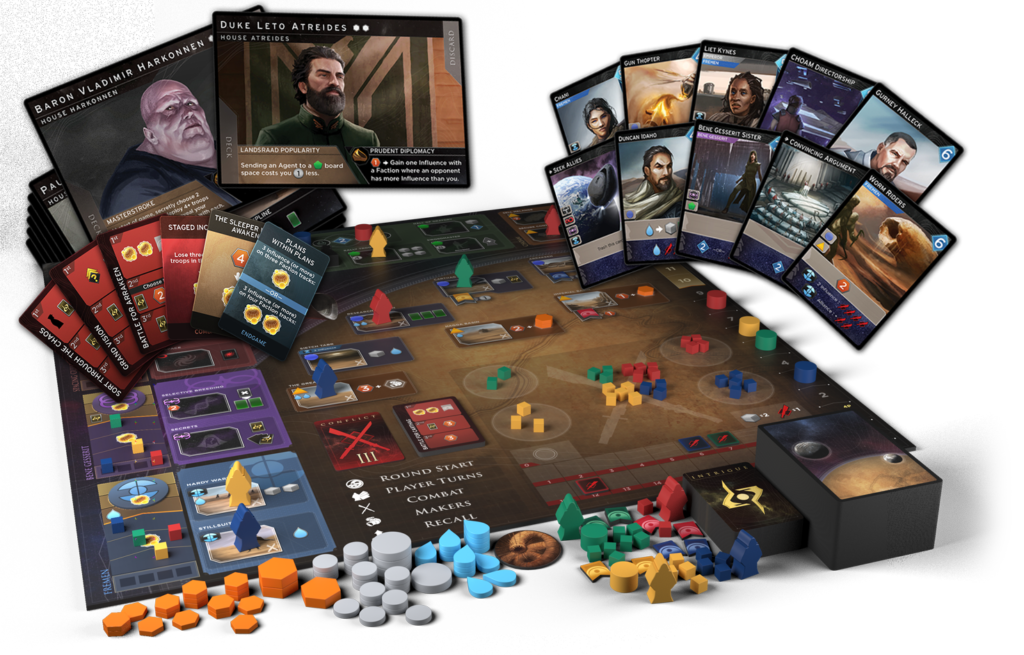
Driving up the level of influence you have with each of them gives you benefits. The most important benefit, as with any Euro worth its salt, is good ol’ Victory Points (VPs). The first person to end a round with 10 VPs triggers the end of the game, but what makes Dune Imperium oh-so-tasty and interesting is that VPs aren’t forever. Although they might live you with on your side of the table for now, others can’t wait to get their grubby little mitts on them.
Each faction awards an Alliance Token to the first player to reach a certain rung on the ladder, and a VP along with it. Don’t count that little chicken until it’s hatched though, nosireebob, because if someone overtakes you on that track, they claim the token, and the VP with it. This might not sound too dramatic, but what we’re talking about here is a two-point swing. Picture it: you’re sat on 10 VPs waiting for the round to end, and for your celebrations to start. Someone else is on 9, and overtakes you on a track. You lose the token and drop to 9, they take it and boost up to 10, rubbing salt into the proverbial wound.
It is by will alone I set my mind in motion
So there’s this tense tussle for points, which fits really nicely with the desert planet setting. Points are like anything else in the harsh landscape – hard to come by. Much like the water on Arrakis, in fact. Water, spice, and cold, hard cash are the currencies in play, and it’s a game where it’s honestly pretty difficult to min-max. You need a little bit of everything, as you tend to need one type in order to generate another. The cards, and the actions that come with them, do a fantastic job of carrying the theme.
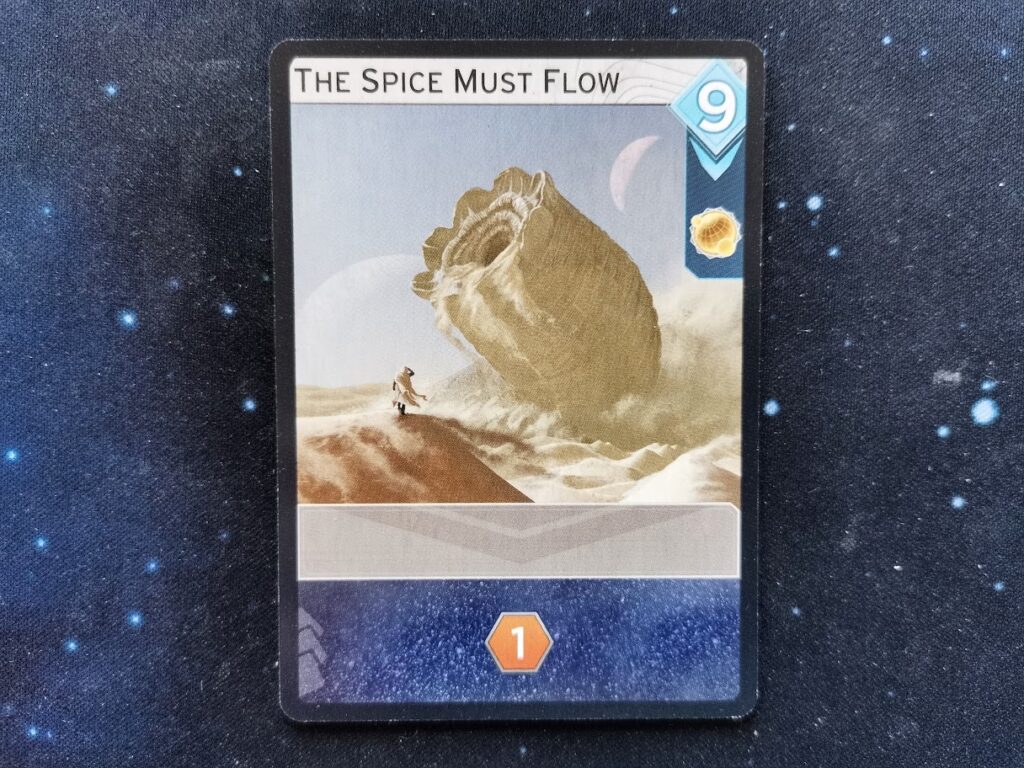
The worker spaces where you send your agents are in limited supply, so there’s a good deal of competition when it comes to who goes where. Your agents are put out onto the board by playing your cards from your hand, from a deck you’ll craft during the course of a game to try to drive things in the direction you want to go. The cards have a really nice multi-use function, which means that as well as allowing you to place a worker on a spot, there are additional bonuses you can take at the same time.
The cards you don’t play are as important as the cards you do. There’s an area on the board devoted to conflict, and the way it’s handled is really nice. During the game you deploy troops to the garrison on the board, which in turn can be put into the conflict area. At the end of the round, the player with the most power in the conflict area takes the best rewards from that round’s conflict cards. Cards still held in your hand are revealed, which can add to the strength. There’s a great feeling of tension, wondering whether someone’s got something decent still in their hand, and deciding whether you want to deploy more troops to pre-empt it.
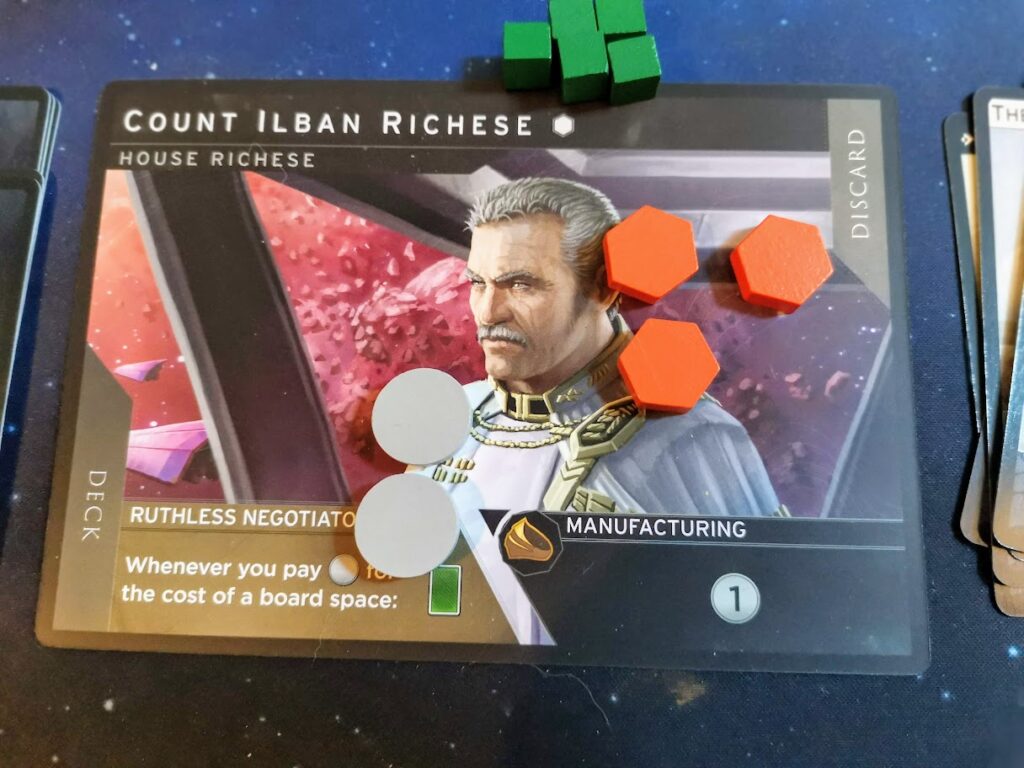
Initially it might seem like you can just get away with not taking part in the conflicts, but so much of the game lies in that space. It feels like playing poker, the sense of some people just cutting their losses and waiting to fight again another day, and others fighting tooth and nail over the precious rewards on offer, waiting to see who can bolster their forces during the card reveal.
The sleeper must awaken
Dune Imperium plays a really tight game, and there’s a lot that I really like about it. You don’t get to cycle through your deck too often, but it still feels like the deck construction is more important than it is in a game like Lost Ruins of Arnak. I like how tight-fisted the game is with resources and points. Getting a few drops of water, or a couple of VPs, feels like a big deal. The game does have a limited number of rounds, driven by the conflict deck, but more often than not (in my experience), the end of the game is triggered by the players.
The VP track is big and bold on the board, so anyone out in the lead can almost feel the unspoken pacts being formed by those attempting to claw them back. The swing of points that can happen late in the game as the Alliance Tokens change hands is really good fun. Despite it being a Euro with no real direct interaction, it certainly feels like a battle.
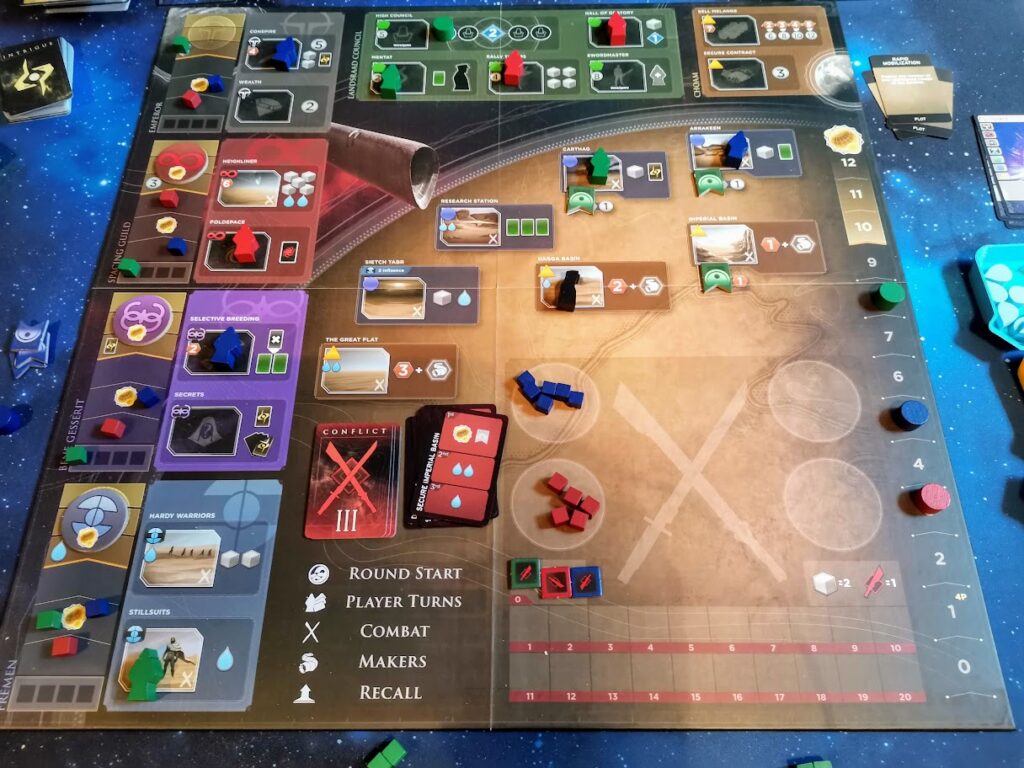
The presentation and artwork are great, but the board annoys me. The middle of the board, which represents the deserts on the planet, is so big and empty. You could argue “Yes, Adam, it’s a desert, that’s the point”, but it feels like a wasted opportunity to me. The conflict area could be much smaller, and then the card market might not even need to be next to the board, which would make the whole thing more neat, and compact.
Final thoughts
Dune Imperium is great. I enjoy it every time I play, and thanks to the various Leaders you can choose to play as, each time you can play with a different strategy. The whole game feels very balanced, and I’ve not (yet!) played a game where there was a winning margin of more than two or three points. It does a great job of managing to feel like a proper worker-placement game, and a deck-building game at the same time.
I think it could do with a way to refresh the cards in the market row. As it stands, if there are five cards there and nobody wants one of them, there’s no real way to get some new cards to choose from. It’s not too much of a problem in a multiplayer game, but in a solo game it can feel like you’ve got to buy something, just to see something new. Speaking of solo, the solo mode is otherwise excellent, and can be played with the included deck, or the great app that Dire Wolf have created.
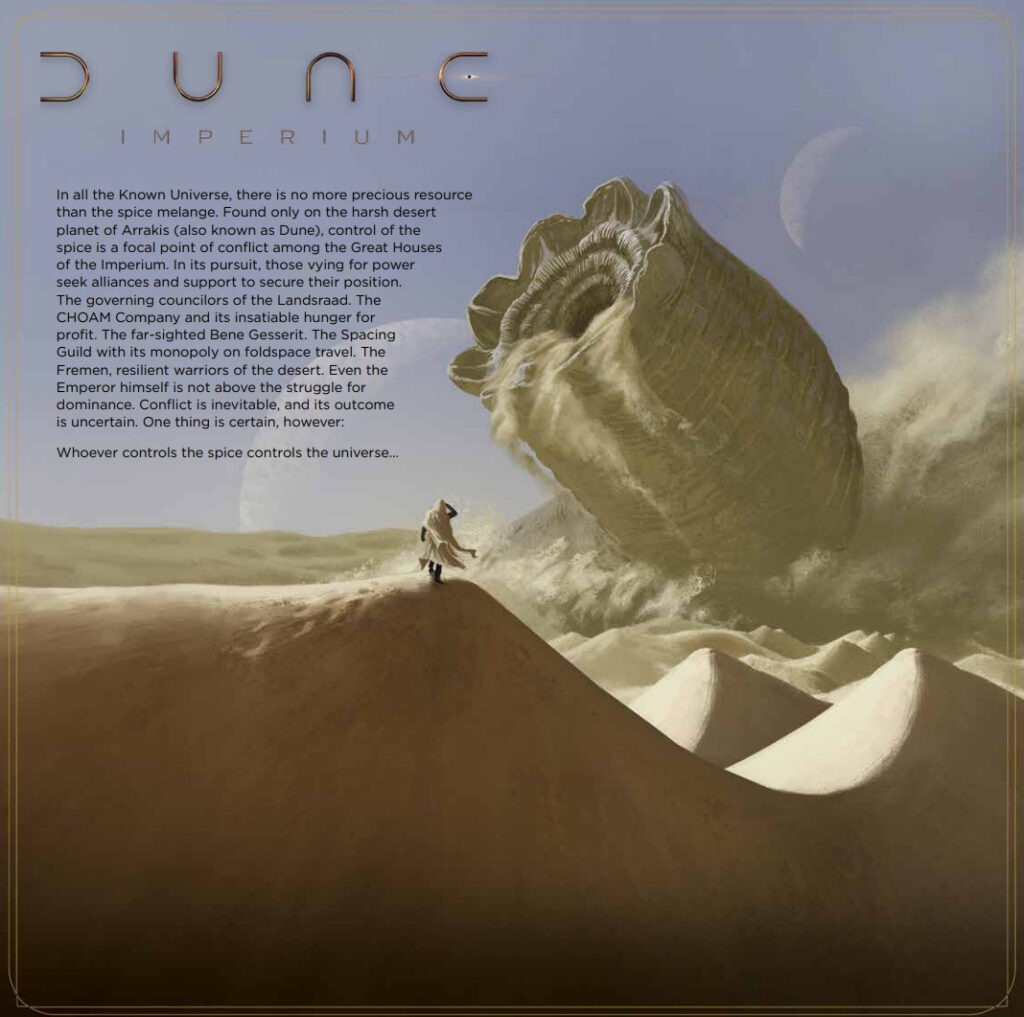
Overall, Dune Imperium does a really good job of capturing the feel of Dune, especially when you’re talking about the new film version, which this game shares its artistic style with. The comparisons with Arnak are inevitable really, given the mass appeal of both, the shared mechanisms, and the close release dates. While I’ll still always happily play Arnak, I’d prefer to play Dune Imperium, if I had the choice. There feels like there’s more variety in the game, and the games feel closer, more tense.
Fans of the franchise will eat this game up, and fans of good board games will really enjoy it too. If you fall in the middle of the intersecting circles in that Venn diagram, Dune Imperium is a must-buy.
Dune Imperium is available from our sponsor – Kienda. Sign-up using this link to get 5% off your first order over £60.
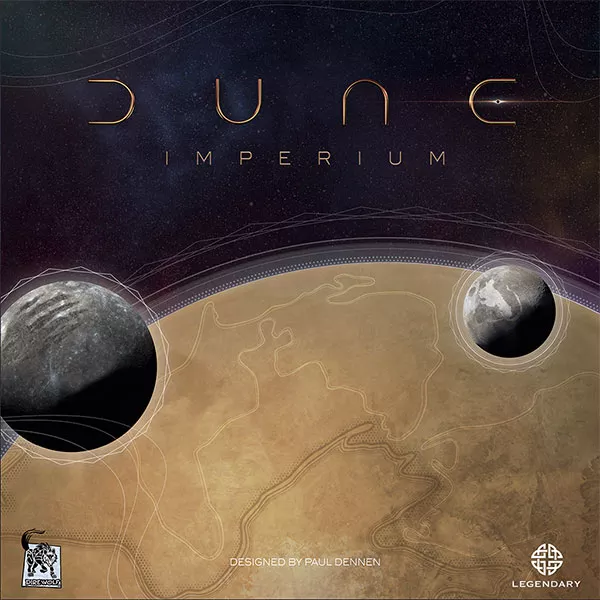
Dune Imperium (2020)
Designer: Paul Dennen
Publisher: Dire Wolf
Art: Clay Brooks, Raul Ramos, Nate Storm
Players: 1-4
Playing time: 90-120 minutes
Adam is a board game critic with over 15 years of experience in the hobby. A semi-regular contributor to Tabletop Gaming Magazine and other publications, he specialises in heavyweight Euro games, indie card games and transparency in board game media.

Dice-Based Imperium Row ‘Churn’
Use two standard 6-sided dice to simulate the acquiring of cards from the Imperium Row by your Rivals.
At the end of each of your Reveal turns, roll the two dice.
Counting cards starting from the left of the Imperium Row,
Discard any card corresponding to the numbers you rolled.
If you roll the same result (from 1 to 5) on both dice – discard only one card.
Ignore any 6 that you roll – discard no card.
I’ve not come across this before. Is it an official variant, or something fan-made? Either way, it’s a great idea, and exactly what it needs.
Its added variant in expansion :). If you haven’t played I highly recommend!